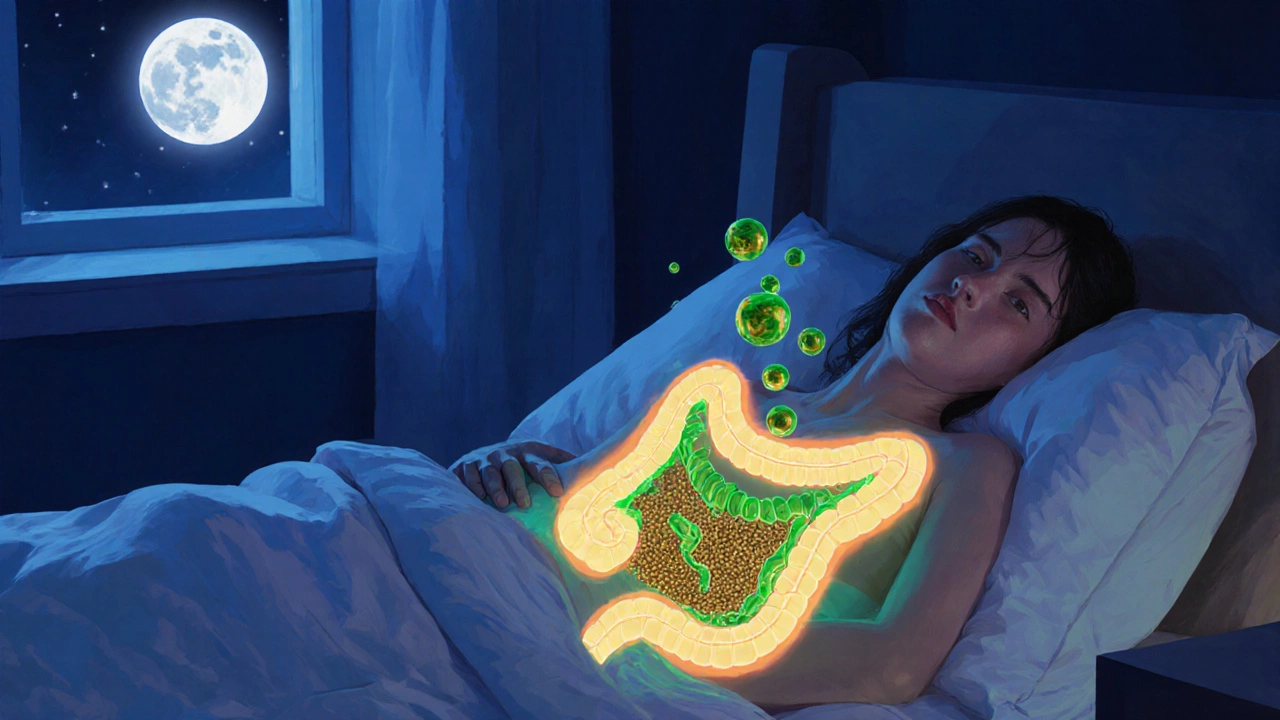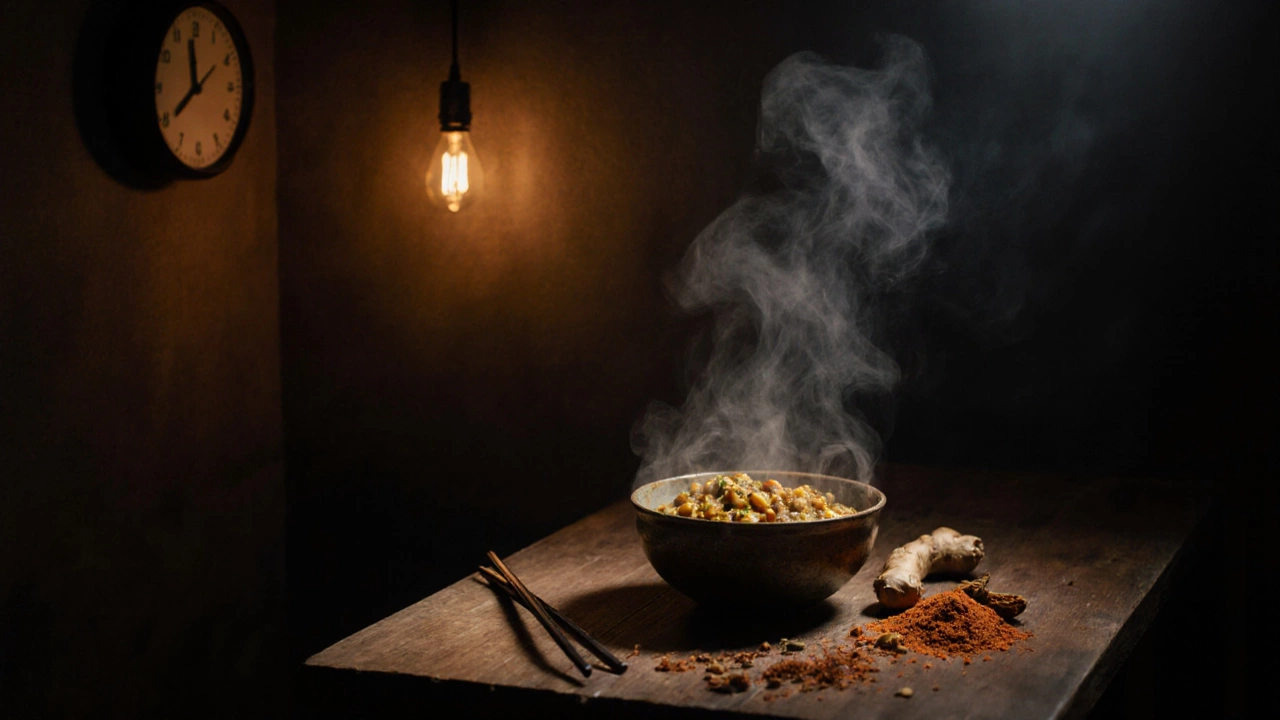Ever sat down for dinner with a warm bowl of dal, only to wonder if it’s a good idea to eat it this late? You’re not alone. Many people in Indian households grow up hearing, "Don’t eat dal at night"-but rarely are they told why. If you’ve ever felt bloated, sluggish, or had trouble sleeping after a late dal meal, there’s a reason behind it. It’s not just an old wives’ tale. Science and tradition both point to the same conclusion: eating dal at night can slow down your digestion and disrupt your sleep.
Dal is heavy on the stomach
Dal, whether it’s masoor, toor, chana, or moong, is packed with protein and fiber. That’s great for lunch, when your body is active and your metabolism is humming. But at night, your digestive system slows down. Your stomach doesn’t produce as many enzymes, your gut motility drops, and your liver shifts into repair mode instead of processing food. When you eat dal after sunset, your body struggles to break down those complex carbs and proteins. The result? Gas, bloating, and a heavy feeling that lingers for hours.
One 2023 study from the Indian Journal of Clinical Biochemistry found that participants who ate lentils after 8 p.m. experienced a 40% increase in nighttime gastric discomfort compared to those who ate the same meal at noon. The fiber in dal ferments in the gut overnight, producing methane and hydrogen gas. That’s why you wake up feeling swollen, even if you didn’t eat much.
It disrupts sleep quality
Sleep isn’t just about closing your eyes. It’s about your body entering deep rest cycles where repair and detox happen. When your digestive system is still working hard to break down dal, your body can’t fully relax. The constant low-level activity in your gut keeps your nervous system slightly activated. You might not realize it, but you’re not getting the deep, restorative sleep you need.
People who regularly eat dal after 9 p.m. report more frequent nighttime awakenings, restless legs, and even acid reflux. Dal is naturally slightly acidic, especially when cooked with tomatoes or tamarind. At night, when stomach acid doesn’t get diluted by movement or activity, that acidity can rise and cause discomfort. It’s not just about the dal-it’s about what it’s cooked with.
Not all dal is the same
Here’s the twist: not every type of dal is equally hard to digest at night. Moong dal, especially when peeled and well-cooked, is the lightest option. It’s lower in fiber and easier to break down. Many Ayurvedic practitioners actually recommend moong dal for evening meals-if it’s prepared right. Split yellow moong dal, boiled until mushy, with a pinch of cumin and ginger, can be gentle on the stomach even after dark.
On the other hand, chana dal (chickpeas) and urad dal are dense, high in oligosaccharides, and notoriously hard to digest. These are the ones that cause the worst bloating. If you’ve ever eaten rajma or chana dal at night and felt like you swallowed a rock, now you know why.

What about dal recipes that are simple and quick?
Simple dal recipes-like the one-pot moong dal with garlic and turmeric-are tempting for late dinners. They’re fast, healthy, and feel comforting. But speed doesn’t change the biology. Even a 15-minute dal still contains the same proteins and fibers. If you’re eating it at 10 p.m., your body still has to process it before bed.
Here’s a better approach: if you really want dal at night, make it lighter. Skip the oil. Skip the tomatoes. Use only water and spices like cumin, asafoetida, and ginger. Cook it until it’s almost soupy. Eat it at least two hours before bed. And keep the portion small-half a cup, not a full bowl.
When is the best time to eat dal?
The sweet spot for dal is between 1 p.m. and 5 p.m. That’s when your digestive fire-known as agni in Ayurveda-is strongest. Your body is still active, your muscles are moving, and your metabolism is primed to handle protein and fiber. Eating dal then gives you sustained energy without the digestive burden.
If you’re used to having dal at night, try shifting it to lunch for just one week. You might notice you sleep deeper, wake up less bloated, and feel more energized in the morning. It’s not magic. It’s just biology.

What to eat instead at night
If you’re craving something warm and comforting after dinner, go for lighter options:
- Khichdi made with white rice and moong dal (in small amounts)
- Vegetable soup with a dash of turmeric
- Steamed vegetables with a spoon of ghee
- Warm milk with cardamom (if you tolerate dairy)
- Roasted pumpkin or sweet potato
These options are easy to digest and won’t trigger nighttime discomfort. They also help regulate blood sugar, which is important for stable sleep.
Myth: Dal causes weight gain at night
It’s not that dal itself makes you gain weight. It’s that when you eat it late, your body doesn’t burn the calories efficiently. Calories from protein and fiber still count. But if your body isn’t moving, those nutrients get stored instead of used. Over time, that adds up.
Plus, late-night eating often leads to mindless snacking. You eat dal, feel bloated, then reach for a snack to “feel better.” That’s when the real weight gain happens-not from the dal, but from the chain reaction it starts.
Final thought: Listen to your body
Some people can eat dal at night without issues. Their digestion is strong, their lifestyle is active, and they eat early. But for most people-especially those with sedentary jobs, stress, or irregular sleep patterns-dal at night is a recipe for discomfort.
Try this: skip dal for one week at night. Replace it with something lighter. See how you feel in the morning. If you wake up feeling fresh, not bloated, and sleep deeper, you’ll know the truth isn’t in tradition-it’s in your own body.
Dal is nutritious. It’s cheap. It’s full of plant-based protein. But like all good things, timing matters. Eat it when your body can use it-not when it’s trying to rest.
